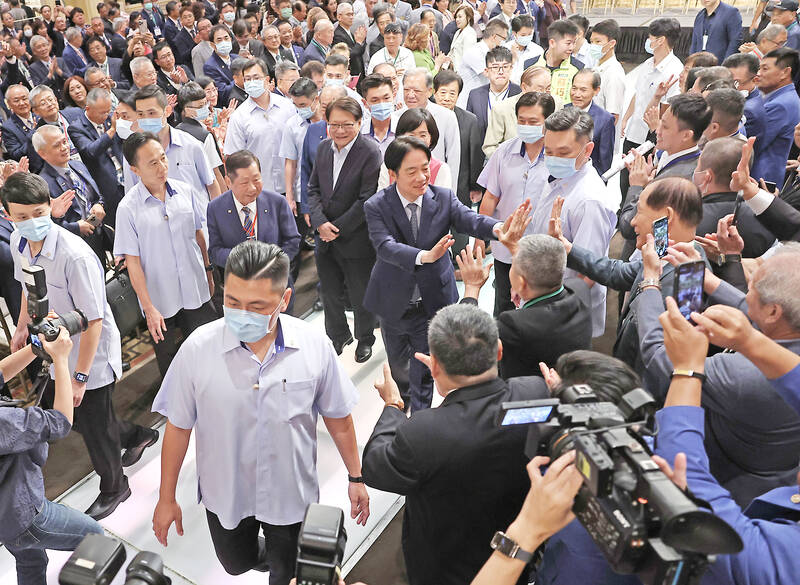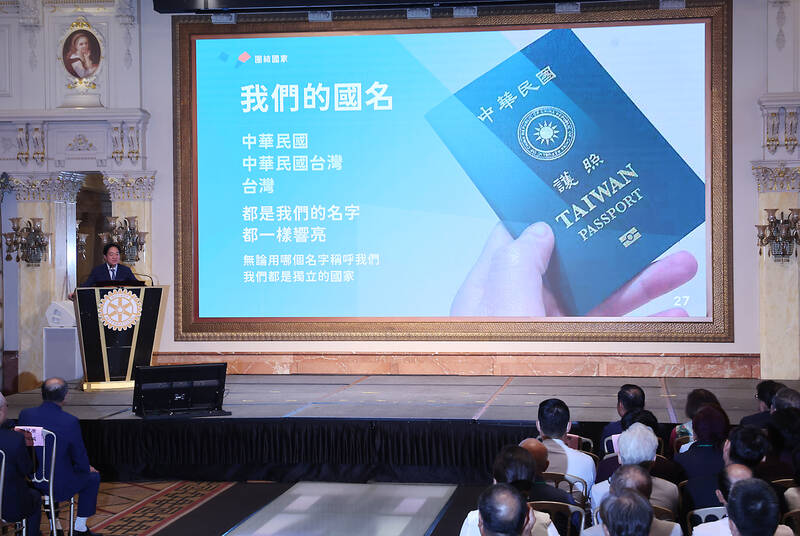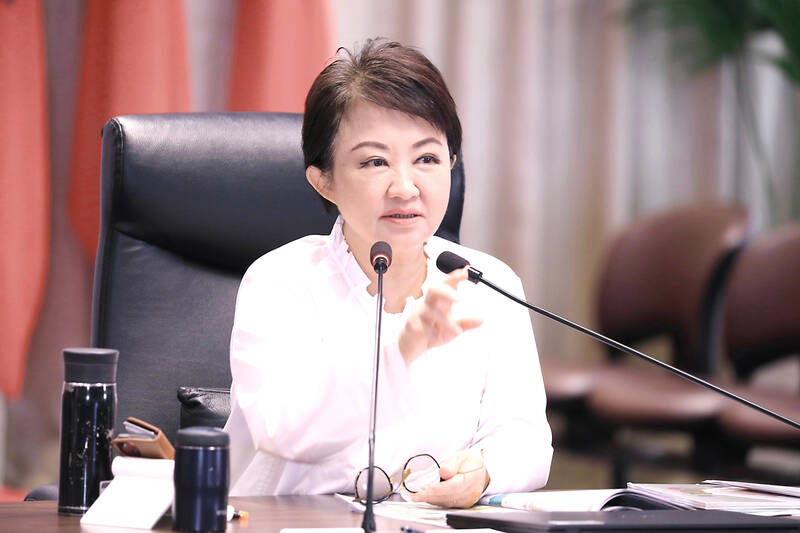On Sunday, President William Lai (賴清德) delivered a strategically brilliant speech.
It was the first of his “Ten Lectures on National Unity,” (團結國家十講) focusing on the topic of “nation.”
Though it has been eclipsed — much to the relief of the opposing Chinese Nationalist Party (KMT) and Taiwan People’s Party (TPP) — by an ill-advised statement in the second speech of the series, the days following Lai’s first speech were illuminating on many fronts, both domestic and internationally, in highlighting the multi-layered success of Lai’s strategic move.

Photo: CNA
“OF COURSE TAIWAN IS A COUNTRY”
Never before has a Taiwanese president devoted an entire speech to laying out clearly, point-by-point and unequivocally how Taiwan is unquestionably a sovereign nation.
Without mentioning it by name, Lai laid out the four key aspects forming the definition of a state codified in the 1933 Montevideo Convention: having a permanent population, a defined territory, a government and the capacity to enter into relations with other states — followed by clear, obvious examples on how Taiwan meets that definition.

Photo: CNA
By quoting from the text, he punctured Beijing’s claims that UN Resolution 2758 from 1971 gives them sovereignty over “Taiwan Province.” He noted that many countries have passed resolutions backing this point, including the US, UK, Canada, Australia and various European states, including the Netherlands, Czechia and Belgium.
Lai gave a short history, outlining modern Taiwan’s origins from pre-history to the Indigenous peoples to the modern era, noting that the People’s Republic of China (PRC) has never ruled Taiwan, that Taiwan was only a province of China for eight years, and that in the 1951 Treaty of San Francisco Japan ceded sovereignty over Taiwan, Penghu, Kinmen and Matsu but did not give it to the PRC.
He underscored that the Republic of China (ROC) constitution gives sovereignty to the 23 million citizens of the country. The official name on the passport is Republic of China, but that “allies” and “international friends” refer to Taiwan as the “Republic of China,” “Republic of China (Taiwan),” or simply “Taiwan.”

Photo: Lo Yau-Tung, Taipei Times
Driving home the “sovereignty of the people” theme, Lai noted that polls show that protecting national sovereignty is a shared position of the vast majority, with about 85 percent agreeing Taiwan’s future should be decided by all 23 million people, and nearly 80 percent recognizing the ROC and the PRC as separate entities.
He then listed some of Taiwan’s many achievements but pointed to external threats: “Taiwan faces five major national security and united front threats: China’s threat to sovereignty, infiltration and espionage against Taiwan’s military, attempts to confuse Taiwanese identity, united front infiltration via cross-strait exchanges, and ‘integration development’ efforts to attract Taiwanese businesses and youth.”
STRATEGIC STRIKE
First and foremost, this speech was a well-crafted strategic strike delivered right to the heart of the pan-blue bloc, with international reactions an important and useful element, but ultimately secondary.
The speech was crafted in such a way that the majority of Taiwanese would agree with most or all of it. In spite of the “unity” theme, Lai is well aware that 30 to 40 percent of the country will not unify behind him regardless of what he says.
The pan-blue opposition is struggling and aware they are at risk of losing their legislative majority through the recall process. Twenty-four KMT lawmakers are confirmed to be facing recall votes on July 26, with another seven still in the process of being confirmed.
The KMT’s own efforts to launch recalls against Lai’s Democratic Progressive Party (DPP) lawmakers have all crumbled through lackluster motivation, limited resources and widespread arrests of their campaigners for forging signatures of people on party membership rolls.
Many have confessed, leaving little doubt that much of the alleged fraud was real.
With his opponents on the ropes, Lai delivered a hard punch right where it hurts the pan-blues the most: their support for the widely unpopular “one China principle,” stating that Taiwan is a province of China.
They could only take one of three stances: defend the “one China principle,” try to change the subject, or hide and run for cover.
The TPP, which implicitly supports the “one China principle” by strongly allying with the KMT, took the hide and run for cover approach. By never explicitly endorsing it, they have some leeway to get away with this.
Though many in the KMT followed the same strategy, this is harder for the KMT to pull off. Their hardcore base supports the “one China principle,” and the party needs all the votes they can get turning out to counter the recalls, so rejecting it is out of the question.
Taichung Mayor Lu Shiow-yen (盧秀燕) — widely considered the KMT’s likely 2028 presidential nominee and possible party chair contender — treaded very carefully. Initially, she dismissed Lai’s speech as his own “historical opinion” that he ought to “update” (said in English).
She later followed up with a more thought-out response and tried to change the subject after coming under fire for not clarifying what exactly was merely Lai’s “opinion,” saying that Taiwan is a democracy and she respects and does not oppose the president expressing his historical viewpoint. Referring to Lai’s references to Taiwan’s pre-history and fossils, and suggested he “talk about people’s hardships, don’t just talk about wooly mammoths,” citing inflation, tariffs and other important issues.
She never clarified her “historical opinion” comment.
CCP RESPONSE
Though Lai did not say anything controversial or outside of the historical record, the Chinese Communist Party (CCP) reacted furiously to Lai’s neatly packaged and calmly delivered debunking of their propaganda line.
Unlike the KMT’s need to tiptoe around local domestic public opinion, the CCP blasted forth with full-throated vitriol for their domestic and international audiences.
A commentary in the People’s Daily highlighted by Manoj Kewalramani from Tracking People’s Daily stated that Lai “wantonly spread ‘Taiwan independence’ separatist rhetoric and hyped up the escalation of a ‘new two-state theory’ and that his speech was filled with all kinds of factual errors, historical fallacies, and twisted logic and evil arguments; it was highly provocative and extremely harmful.”
“It is a naked ‘Taiwan independence’ manifesto that incites cross-strait opposition and confrontation, once again demonstrating [Lai’s] ignorance and madness, once again exposing his incorrigible ‘Taiwan independence’ nature and ugly face, and confirming his role as a ‘troublemaker, ’‘danger-maker’ and ‘war-maker.’”
The CCP also referenced the theory that Taiwan’s Indigenous people originally migrated from what is modern-day Fujian, suggesting a Chinese origin. By this logic, the original inhabitants of the Americas should be considered of Russian origin.
Lai must have chuckled at how effective the CCP is at helping turn out the pan-green base for the recall votes, undoing much of their United Front Work Department efforts. He knows the CCP ultimately views maintaining domestic control in China as more important than winning over Taiwanese.
KMT Chairman Eric Chu (朱立倫), referring to over-the-top CCP attacks on the DPP, said that this is when “the DPP is most happy.” They certainly do help with pan-green voter turnout.
The international press also turned this into a win diplomatically with Taiwan’s friends abroad. Though their headline writer missed the point that this was primarily a speech for domestic audiences, Reuters headlined their coverage: “Taiwan is ‘of course’ a country, president says in rebuke to China.”
Lai accomplished a lot strategically with this speech.
Then he blew much of it in his second speech by suggesting that elections and the recalls were like hammering out “impurities” in the forging process, which the opposition rightly pointed out sounded authoritarian.
It was also their perfect change the subject, get out of jail free card.
Donovan’s Deep Dives is a regular column by Courtney Donovan Smith (石東文) who writes in-depth analysis on everything about Taiwan’s political scene and geopolitics. Donovan is also the central Taiwan correspondent at ICRT FM100 Radio News, co-publisher of Compass Magazine, co-founder Taiwan Report (report.tw) and former chair of the Taichung American Chamber of Commerce. Follow him on X: @donovan_smith.

Jacques Poissant’s suffering stopped the day he asked his daughter if it would be “cowardly to ask to be helped to die.” The retired Canadian insurance adviser was 93, and “was wasting away” after a long battle with prostate cancer. “He no longer had any zest for life,” Josee Poissant said. Last year her mother made the same choice at 96 when she realized she would not be getting out of hospital. She died surrounded by her children and their partners listening to the music she loved. “She was at peace. She sang until she went to sleep.” Josee Poissant remembers it as a beautiful

Before the last section of the round-the-island railway was electrified, one old blue train still chugged back and forth between Pingtung County’s Fangliao (枋寮) and Taitung (台東) stations once a day. It was so slow, was so hot (it had no air conditioning) and covered such a short distance, that the low fare still failed to attract many riders. This relic of the past was finally retired when the South Link Line was fully electrified on Dec. 23, 2020. A wave of nostalgia surrounded the termination of the Ordinary Train service, as these train carriages had been in use for decades

Lori Sepich smoked for years and sometimes skipped taking her blood pressure medicine. But she never thought she’d have a heart attack. The possibility “just wasn’t registering with me,” said the 64-year-old from Memphis, Tennessee, who suffered two of them 13 years apart. She’s far from alone. More than 60 million women in the US live with cardiovascular disease, which includes heart disease as well as stroke, heart failure and atrial fibrillation. And despite the myth that heart attacks mostly strike men, women are vulnerable too. Overall in the US, 1 in 5 women dies of cardiovascular disease each year, 37,000 of them

Politically charged thriller One Battle After Another won six prizes, including best picture, at the British Academy Film Awards on Sunday, building momentum ahead of Hollywood’s Academy Awards next month. Blues-steeped vampire epic Sinners and gothic horror story Frankenstein won three awards each, while Shakespearean family tragedy Hamnet won two including best British film. One Battle After Another, Paul Thomas Anderson’s explosive film about a group of revolutionaries in chaotic conflict with the state, won awards for directing, adapted screenplay, cinematography and editing, as well as for Sean Penn’s supporting performance as an obsessed military officer. “This is very overwhelming and wonderful,” Anderson